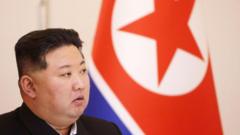Can a North Korean Defector Hold Kim Jong Un Accountable for Abuse?

Challenging the North Korean Regime: A Defector's Fight for Justice
In a groundbreaking move, a North Korean defector, Choi Min-kyung, is poised to file civil and criminal charges against North Korean leader Kim Jong Un and four other officials. This landmark case, set to be filed on Friday, represents a significant step towards accountability for human rights abuses in North Korea. Choi's allegations include sexual abuse and torture, stemming from her experiences after being forcibly repatriated to North Korea in 2008. This case is not just about personal justice; it's a pivotal moment in the ongoing struggle against the oppressive regime in Pyongyang.
The Journey of Choi Min-kyung
Choi Min-kyung's harrowing journey began in 1997 when she fled North Korea, seeking refuge in China. However, her hopes for freedom were shattered in 2008 when she was forcibly returned to North Korea. Upon her return, Choi faced unimaginable horrors, including sexual abuse and torture at the hands of the regime. Such experiences have left her with deep psychological scars, requiring ongoing medication to cope with the trauma.
After enduring these abuses, Choi managed to escape North Korea once again in 2012 and eventually settled in South Korea. It is from this safe haven that she now seeks justice, aided by the Database Center for North Korean Human Rights (NKDB), a South Korea-based rights group dedicated to advocating for North Korean defectors.
The Significance of the Legal Action
This legal action marks the first time a North Korean-born defector has taken legal steps against the regime. Choi's case is particularly noteworthy as it combines both civil and criminal charges, a departure from previous lawsuits, which typically focused solely on civil litigation. The executive director of NKDB, Hanna Song, emphasized the importance of pursuing criminal charges in parallel to civil cases, as it reflects a more serious approach to accountability for human rights violations.
Human Rights Violations in North Korea
For decades, international human rights organizations have documented numerous violations perpetrated by the North Korean regime. Reports detail a range of abuses, including:
- Systematic discrimination based on gender and class.
- Abuse of political prisoners.
- Forced labor and human trafficking.
- Severe restrictions on freedom of expression and movement.
The North Korean government has consistently denied these allegations, and most court rulings against Pyongyang have been largely symbolic, lacking any real enforcement. For instance, a Seoul court recently ordered North Korea to pay compensation to former prisoners of war, but the regime has remained unresponsive.
Previous Court Cases and Their Implications
In recent years, South Korean courts have ruled against North Korea in several high-profile cases. In 2023, three South Korean men, who were exploited as prisoners of war during the Korean War, were awarded 50 million won (approximately $36,000) each. Additionally, in 2024, five Korean Japanese defectors received 100 million won each for their wrongful detention and forced labor in North Korea. Although these rulings offered financial compensation, they also served a more profound purpose: they provided acknowledgment of the victims' suffering.
The Role of the United Nations and International Criminal Court
The NKDB plans to take Choi's case to international bodies, including the United Nations and the International Criminal Court (ICC). Such actions aim to draw global attention to the dire human rights situation in North Korea. The involvement of these international organizations could lead to increased pressure on the North Korean regime and potentially pave the way for broader accountability measures.
The Importance of Acknowledgment
As Choi Min-kyung herself stated, her goal is not only to seek justice for her suffering but also to ensure that no more innocent North Koreans endure similar abuses. She expressed a deep sense of responsibility to hold the Kim dynasty accountable for their crimes against humanity. The desire for acknowledgment resonates with many victims of human rights violations, who often seek more than just financial compensation; they yearn for their stories to be recognized and validated by the state.
The Psychological Impact of Torture and Abuse
Choi's case highlights the long-lasting psychological effects of torture and abuse. Survivors often face a range of mental health challenges, including post-traumatic stress disorder (PTSD), anxiety, and depression. The trauma can be exacerbated by feelings of isolation and the stigma surrounding mental health issues, particularly in cultures that prioritize strength and resilience.
Choi's ongoing struggle with psychological trauma underscores the importance of providing adequate mental health support for defectors. Access to counseling and therapy can play a crucial role in helping survivors rebuild their lives and regain a sense of normalcy.
Future Implications for North Korean Human Rights
The filing of civil and criminal charges by Choi Min-kyung could have far-reaching implications for the future of human rights in North Korea. By taking this bold step, Choi not only seeks personal justice but also aims to inspire other survivors to speak out against the regime. This case may set a precedent for future legal actions and help galvanize the international community in its efforts to hold North Korea accountable for its human rights violations.
The Role of International Advocacy
The international community has a vital role to play in supporting defectors and advocating for human rights in North Korea. Organizations like the NKDB are instrumental in raising awareness and providing resources for those who have suffered under the regime. Increased pressure from foreign governments, coupled with international legal action, could lead to significant changes in how North Korea is treated on the global stage.
Conclusion: A Call for Justice and Accountability
Choi Min-kyung's courageous decision to file legal action against Kim Jong Un and other North Korean officials represents a pivotal moment in the fight for human rights. Her case serves as a beacon of hope for countless others who have suffered under the oppressive regime. As advocates for human rights continue to push for accountability and justice, it is essential to remember that every step taken toward recognition and acknowledgment is a step toward healing and restoration.
While the road ahead may be fraught with challenges, Choi's resolve reminds us that the pursuit of justice is a powerful tool in the fight against tyranny. It is a call to action not just for the international community, but for all individuals who believe in the inherent dignity and rights of every human being.
Frequently Asked Questions
What prompted Choi Min-kyung to file charges against North Korea?
Choi decided to file charges due to the severe abuses she faced after being forcibly repatriated to North Korea, including sexual abuse and torture. She aims to hold the regime accountable for these human rights violations.
What types of charges is Choi filing against Kim Jong Un?
Choi is filing both civil and criminal charges against Kim Jong Un and four other officials, marking a significant legal action against the North Korean regime.
How can the international community support North Korean defectors?
The international community can support defectors by raising awareness about their plight, advocating for their rights, and pushing for legal action against human rights violators in North Korea.
As we reflect on Choi Min-kyung's courageous fight for justice, let us consider: What more can we do to support human rights for all, especially for those living under oppressive regimes? #NorthKorea #HumanRights #JusticeForDefectors
Published: 2025-07-10 05:52:12 | Category: technology



